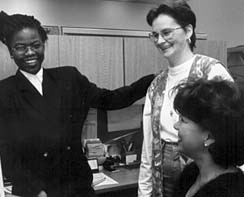 |
 | ||
 | |||
 | |||
 | |||
|
[ en français ] |
 Abigail Forson did her internship with CRC Sogama where she worked with Marjolaine Tremblay, and Carole Asselin (seated). | ||
|
How can one improve the skills of civil servants in developing countries? Numerous international organizations have pondered this question and have chosen to invest in training. Consequently, two universities have received a mandate to help develop managers and civil servants: McGill and l'Université d'Auvergne in France. Simple solutions for complex problems do not exist - or no longer exist, at any rate. The good times when a government subsidy seemed like the way to provide support for a new international airport, an Olympic stadium, or a jazz festival is past. And finding alternatives requires plenty of imagination. That's what McGill demonstrated in 1994 in giving life to its master's program in Economic Policy Management (best known by its acronym, EPM) The objective, imparted by the World Bank and the African Capacity Building Foundation (ACBF), consists of creating - for developing countries and those who have recently moved away from planned economies - local managers capable of implementing adjustments necessitated by the shift to a competitive economy. To meet this challenge, McGill had to innovate. And perhaps the first and most obvious innovation is the association of two units to run the program, the Faculty of Management and the Faculty of Arts (Department of Economics). "We wish to build a programme that is more practical than theoretical, a programme that will really help managers," affirms Jan Jorgensen, the principal driving force. The participants therefore take less math but study more case studies, real-life situations and practical problems. Abigail Forson, a student from Ghana, sees this emphasis on practicality as one of the programme's great strengths. "As an economist, the programme has helped me to refine the necessary analytical skills and at the same time deepened my judgement and personal confidence." She and her colleagues also have the opportunity to improve their confidence and skills during a six-month internship which accompanies the eighteen months of classroom training. The university has also accepted a new challenge: each year, placing around thirty students in internships which, ideally, improve their ability and which relate not just to any country but to the country of the student's origin. Few may pass as successfully as an internship in the Antilles that promised nothing special but which ultimately permitted the student to particpate in an audacious reform of fiscal strategies. But that's the goal. "We consider it a benefit to have the students participate in their choice of their internship," said Linda Montreuil, the program administrator. "They must specify what type of internship they wish, in what type of organization, in what city - and we attempt to organize meetings between the students and their employers before the internship takes place." The master's program in economic policy management also distinguishes itself by an unprecedented inversion. The students, practically all anglophones, take all of their intensive courses in French. And McGill recognizes their efforts by awarding "Certificates of Competence" in French. According to Forson, this characteristic has significant tangible benefits, especially for African students. "Ghana, an anglophone country, is encircled by francophone countries; at the Ministry of Finance where I work, we are constantly in contact with our colleagues in neighbouring countries." The need for cohesion among the regions contributes to a support for bilingualism. Perhaps the program's greatest original feature is its means of financing. The $44, 000 cost for each student's two years in the programme is assumed by the World Bank, the ACBF and the Canadian International Development Agency (CIDA), a collaboration greatly appreciated by the university community. The programme is an extraordinary opportunity for McGill to demonstrate and add to its expertise. Says Linda Montreuil, "we count on the reputation we will have acquired to interest governments everywhere in the programme's survival." As Forson notes with enthusiasm, "My training here, without necessarily permitting me to resolve all the Ghana's economic problems, is going to help me to evaluate the strengths and weaknesses of various solutions." The donor nations (Canada, of course, but also Japan and some European countries) will see in the survival of this program a pledge for the accumulated yield of money invested. Finally, the leaders of developing nations will undeniably appreciate highly-trained and effective economic managers. McGill, in obtaining this prestigious international program, had to outdo the London School of Economics. The program includes students from Africa, Asia, the Middle East, and South America. The international flavour of the program is complemented by its more immediate environment. Says Forson, "In addition to having learned French, I'm going to preserve the image of Montreal as a peaceful and cosmopolitan city. A marvelous city!" | |||